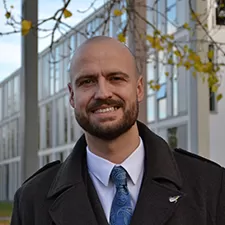State, Elites and Sovereignty in Modern Iran
Free Conference
Saturday, July 22, 2023 – 8:30 am
Innis Town Hall Theatre

Dr Edward Wastnidge is Senior Lecturer (Associate Professor) in Politics and International Studies at the Open University, UK. He received his PhD from the University of Manchester. Edward’s research, focuses on Iranian foreign policy, the intersection of ideas and foreign policy in the Islamic Republic, and Iran’s cultural and religious diplomacy. Edward is Deputy Director of the Sectarianism, Proxies and Desectarianisation project (SEPAD) at Lancaster University, and co-editor of the Identities and Geopolitics in the Middle East book series with Manchester University Press.Dr Wastnidge is the author of Diplomacy and Reform in Iran: foreign policy under Khatami, and co-editor of Saudi Arabia and Iran: the struggle to shape the Middle East. He has authored numerous peer-reviewed articles, book chapters and policy briefs on Iranian foreign policy. A full list of his publications and further biographical details can be found here: https://www.open.ac.uk/people/eaw358
Abstract
This paper explores how the world’s pre-eminent theocracy, the Islamic Republic of Iran, has historically articulated a worldview drawing on specific ideas around the relationship between religion and the state that challenge understandings of sovereignty in international relations. This can be seen in the role that religion has played in the foreign policy of Iran since the revolution. Tehran’s self-anointed role as defender of the Shia, along with its own ummah-wide aspirations, have given it a transnational reach that at times chafes against Western-defined notions of state sovereignty, affording it considerable avenues for influence in the Middle East. The paper applies the notion of ‘spiritual security’, a term with its roots in the close relationship formed Inbetween the state and Orthodox church in Putin’s Russia, to the case of Iran during the Islamic Republic era. In doing so, it explores the interplay between of transnational religious influence and foreign policy, demonstrating Iran’s unique experience of cultivating a sense of ‘spiritual sovereignty’ that extends beyond its territorial borders.